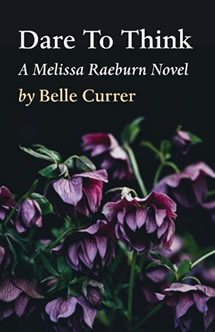Reviewed by Robert Goodman.
By Belle Currer, Tablo Press.
 Given the notes at the back of the book give this away, it should be no secret that Belle Currer is actually Australian crime writer Kel Robertson. Robertson wrote a series of political crime thrillers featuring Inspector Brad Chen starting with 2006’s Dead Set. He has reinvented himself a couple of times, now as Belle Currer with the first book in a new dystopian crime series called Dare to Think.
Given the notes at the back of the book give this away, it should be no secret that Belle Currer is actually Australian crime writer Kel Robertson. Robertson wrote a series of political crime thrillers featuring Inspector Brad Chen starting with 2006’s Dead Set. He has reinvented himself a couple of times, now as Belle Currer with the first book in a new dystopian crime series called Dare to Think.
The book opens with a grizzly crime: two families, including children, slaughtered in a small Cornwall town. Local detective Melissa Raeburn notices almost immediately that the father of one and the mother of the other is missing. It soon becomes clear that the two missing are members of the security services, the SSB. But the SSB is not interested in investigating either the murders of the disappearances. Instead, they leave the job in the hands of Raeburn and her team, only Raeburn herself is ex-SSB and smells a rat. Raeburn understands that her team has been set up to fail but anonymous hints keep pushing her to dig further into the mystery than might be safe for her.
Dare to Think is set in Cornwall but not as we know it. While the setting feels post-World War II, it emerges that this is sometime in a dystopian future. Following some unspecified conflict over (or with?) artificial intelligence, the world (or at least Britain) has returned to a pre-computer age but has also ended up with a surveillance state run by the feared SSB. There are few explicit info dumps and Currer is spare with the details of this world which is frustrating in some ways but in others makes it feel more real. The characters, at least, know what the score is and act accordingly.
Raeburn herself runs to a fairly typical model – a crack investigator brought low by her own abilities, sent out to pasture but still kept on a leash by her former masters. Raeburn is a keen investigator who does not know when to let a lead go for her own good and the good of her team who also end up in the crosshairs. And yet despite all of her initiative, Raeburn essentially loses all of her agency for most of the explosive finale which exposes an incredibly convoluted plot and turns on a group of practically psychopathic, moustache-twirling villains.
Given their predilection to preference authority, crime fiction is a great way to explore dystopian world and there have been plenty of recent examples of the dystopian crime fiction subgenre (anything by Ben Winters, The Night Market by Jonathan Moore, Andrew Hunter Murray’s The Last Day and The Barrier by Shankari Chandran). But the action in this book occurs so far from the centre of power and removed from the events that created it, that it is hard through the lens of this story to get a good handle on the world that Currer has tried to create. Readers will get a sense of some past conflagration, but no real details and no understanding of the result of that conflict or how it would have given rise to this particular form of authoritarian regime. There are clearly plans for more books in this series and it will be interesting to see if they can put more meat on these intriguing bones.
This and 500 more reviews can be found at www.pilebythebed.com.











